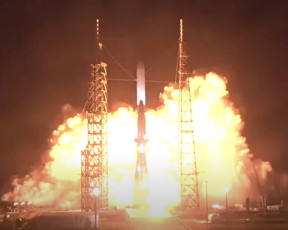Home > Press > The National Space Society Congratulates Blue Origin on the Inaugural Flight of New Glenn: The Heavy Lift Reusable Rocket Will Open New Frontiers and Provide Healthy Competition
 |
| Blue Origin’s inaugural launch of New Glenn
Credit: Blue Origin |
Abstract:
The National Space Society sends heartfelt congratulations to Blue Origin, its employees and leaders, and to founder Jeff Bezos, on the successful first flight of the New Glenn launch vehicle. The heavy lift rocket launched at 2:05 am Eastern Time on January 16 and achieved its primary goal of reaching orbit with its upper stage. While the first stage did not land on the seagoing recovery barge as hoped, this was a stretch goal for the reusable rocket. Overall, the mission was hugely successful for an inaugural launch.
The National Space Society Congratulates Blue Origin on the Inaugural Flight of New Glenn: The Heavy Lift Reusable Rocket Will Open New Frontiers and Provide Healthy Competition
Kennedy Space Center, FL | Posted on January 17th, 2025
Blue Origins New Glenn reaching orbit on its first attempt represents a huge milestone for the company, said Dale Skran, NSS COO and SVP. Its great to see Blue making solid progress toward offering competition to SpaceX and providing customers with additional reusable vehicles capable of carrying large payloads into space.
Bezos founded Blue Origin in 2000 and has worked continuously to perfect a series of clean-sheet powerful rocket engines, launch vehicles, and spacecraft. The companys reusable New Shepard suborbital rocket has flown 28 times with only one anomaly during an uncrewed flight, from which the company quickly recovered. Forty-three people have safely flown aboard the New Shepard, with some conducting important microgravity research.
Blue Origin has also pioneered new rocket engine designs, including the powerful BE-4 methane-fueled, reusable powerplant. Seven of these large engines power the New Glenn, and they have also been sold to a Blue Origin competitor, United Launch Alliance, for use on their new Vulcan rocket. Notably, this engine, like the booster itself, is reusablea critical step toward affordable access to Earth orbit and beyond.
Besides the New Glenn rocket, a prototype of the companys Blue Ring spacecraft platform was flown. Future iterations of Blue Ring will include the ability to refuel other spacecraft, provide a platform for other satellites, and act as a space tug to move smaller spacecraft from one orbit to anotherand ultimately to the Moon and beyond.
Blue Origins New Glenn rocket is a potential game changer, said Karlton Johnson, CEO of the NSS. With eventual rapid reusability, New Glenn will become part of the fleet of increasingly affordable launchers. This and the flexible options offered by Blue Ring will change how we use space to improve life on Earth.
With the New Glenn, Blue Origin provides competition for SpaceXs Falcon 9 and Falcon Heavy rockets and ULAs Vulcan rocket, which is critical to affordable and frequent access to space. The NSS welcomes Blue Origin into the small but very successful family of commercial launch providers.
The New Glenn is a key component of Jeff Bezos vision for the development of space, one that resonates strongly with NSS key valuesto settle cislunar space with people working and living in thriving, off-world communities. Bezos was the recipient of the NSSs Gerard K. ONeill Memorial Award for Space Settlement Advocacy in recognition of his efforts to advance space settlement, joining other luminaries such as physicist Freeman Dyson and Apollo astronaut Harrison Schmitt.
That National Space Society also thanks Blue Origins educational organization, Club for the Future, for their support of NSS educational programs. This support enables NSS to impact thousands of students and further support multiple organizations through direct STEM grants.
####
About National Space Society
The National Space Society is the preeminent non-partisan citizen’s voice on space exploration, development, and settlement, reaching millions through its membership, numerous outreach channels, and media activities. The organization was founded in 1987 via a merger of the National Space Institute and the L5 Society.
For more information, please click here
Contacts:
Media Contact:
Rod Pyle: +1 626-399-https://www.einpresswire.com/contact_author/748489401
Copyright © National Space Society
If you have a comment, please Contact us.
Issuers of news releases, not 7th Wave, Inc. or Nanotechnology Now, are solely responsible for the accuracy of the content.
News and information
![]()
Flexible electronics integrated with paper-thin structure for use in space January 17th, 2025
![]()
Quantum engineers squeeze laser frequency combs to make more sensitive gas sensors January 17th, 2025
Possible Futures
![]()
Quantum engineers squeeze laser frequency combs to make more sensitive gas sensors January 17th, 2025
![]()
The National Space Society Congratulates SpaceX on Starships 7th Test Flight: Latest Test of the Megarocket Hoped to Demonstrate a Number of New Technologies and Systems January 17th, 2025
![]()
Chainmail-like material could be the future of armor: First 2D mechanically interlocked polymer exhibits exceptional flexibility and strength January 17th, 2025
Announcements
![]()
Quantum engineers squeeze laser frequency combs to make more sensitive gas sensors January 17th, 2025
![]()
The National Space Society Congratulates SpaceX on Starships 7th Test Flight: Latest Test of the Megarocket Hoped to Demonstrate a Number of New Technologies and Systems January 17th, 2025
![]()
Chainmail-like material could be the future of armor: First 2D mechanically interlocked polymer exhibits exceptional flexibility and strength January 17th, 2025
Aerospace/Space
![]()
Flexible electronics integrated with paper-thin structure for use in space January 17th, 2025
![]()
The National Space Society Congratulates SpaceX on Starships 7th Test Flight: Latest Test of the Megarocket Hoped to Demonstrate a Number of New Technologies and Systems January 17th, 2025
![]()
Bringing the power of tabletop precision lasers for quantum science to the chip scale December 13th, 2024
![]()
Searching for dark matter with the coldest quantum detectors in the world July 5th, 2024










